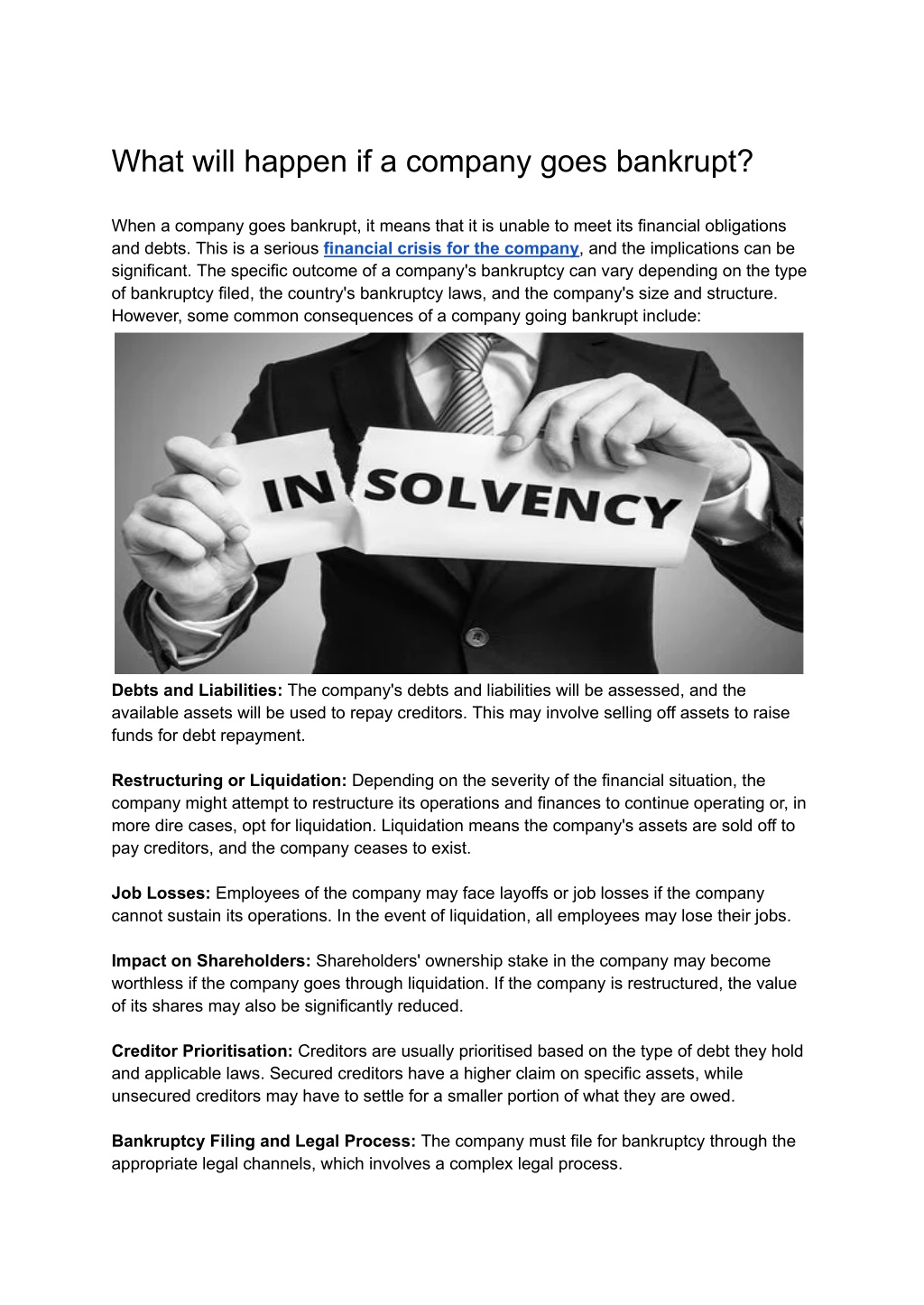Insights into Company Administration: What Happens to Employees When a Company Goes into Liquidation?
Insights into Company Administration: What Happens to Employees When a Company Goes into Liquidation?
Blog Article
The Refine and Effects of a Firm Entering Administration
As a company faces economic distress, the choice to get in management marks a critical juncture that can have far-ranging effects for all included events. The procedure of going into management is elaborate, involving a series of steps that intend to navigate the firm towards potential recovery or, in some instances, liquidation. Recognizing the functions and obligations of a manager, the effect on different stakeholders, and the legal obligations that enter into play is crucial in comprehending the gravity of this scenario. The consequences of such a relocation surge beyond the company itself, shaping its future trajectory and affecting the broader organization landscape.
Summary of Business Management Process
In the realm of company restructuring, a vital preliminary step is acquiring a thorough understanding of the intricate firm management procedure. Company management refers to the formal bankruptcy treatment that aims to save a financially troubled firm or attain a far better result for the company's creditors than would certainly be possible in a liquidation circumstance. This procedure includes the visit of an administrator, who takes control of the company from its supervisors to evaluate the financial scenario and figure out the very best program of action.
Throughout management, the company is approved defense from lawful activity by its financial institutions, offering a halt period to create a restructuring strategy. The manager collaborates with the business's administration, creditors, and various other stakeholders to develop a strategy that might entail selling business as a going worry, getting to a company voluntary arrangement (CVA) with lenders, or eventually putting the business right into liquidation if rescue attempts prove futile. The primary objective of company management is to make the most of the return to creditors while either returning the company to solvency or closing it down in an organized fashion.

Duties and Responsibilities of Manager
Playing a crucial function in supervising the company's decision-making procedures and monetary events, the administrator presumes substantial responsibilities throughout the business restructuring process. The primary duty of the administrator is to act in the very best passions of the firm's lenders, intending to attain the most favorable outcome possible - into administration. This involves conducting a thorough evaluation of the company's economic situation, developing a restructuring plan, and executing approaches to optimize go back to lenders
Additionally, the administrator is accountable for liaising with different stakeholders, including employees, suppliers, and regulatory bodies, to ensure transparency and compliance throughout the administration process. They have to likewise interact successfully with investors, giving normal updates on the firm's progress and seeking their input when necessary.
Furthermore, the administrator plays a crucial duty in taking care of the day-to-day operations of business, making essential choices to keep connection and protect worth. This consists of examining the practicality of different restructuring alternatives, bargaining with financial institutions, and eventually leading the firm towards a successful leave from management.
Influence On Firm Stakeholders
Assuming a critical placement in looking after the firm's economic affairs and decision-making processes, the administrator's activities throughout the company restructuring procedure have a direct impact on various company stakeholders. Clients may experience disruptions in services or product accessibility throughout the management procedure, influencing their trust fund and commitment towards the firm. Additionally, the neighborhood where the business operates can be influenced by prospective job losses or changes in the firm's procedures, influencing local economies.
Lawful Effects and Responsibilities
During the process of company management, cautious consideration of the lawful effects and obligations is extremely important to ensure conformity and safeguard the passions of all stakeholders included. When a company gets in administration, it causes a set of legal demands that have to be stuck to.
In addition, lawful ramifications emerge concerning the therapy of employees. The manager has to follow work regulations pertaining to redundancies, worker civil liberties, and obligations to give required details to worker reps. Failure to adhere to these legal demands can cause lawful action against the firm or its managers.
In addition, the firm entering management might have legal commitments with various events, including suppliers, consumers, and landlords. In blog here essence, understanding and meeting lawful responsibilities are important elements of navigating a firm via the management process. what happens when a company goes into administration.
Methods for Business Healing or Liquidation
In thinking about the future direction of a company in management, tactical planning for either recuperation or liquidation is necessary to chart a practical course ahead. When intending for business recovery, crucial strategies might include carrying out a thorough analysis of business procedures to determine inadequacies, renegotiating agreements or leases to enhance money circulation, and carrying out cost-cutting measures to improve earnings. Additionally, looking for new financial investment or funding options, branching out profits streams, and concentrating on core expertises can all contribute to a successful healing strategy.

Verdict
In verdict, the process of a business going into administration involves the consultation of an administrator, that tackles the obligations of taking care of the company's events. This procedure can have considerable effects for different stakeholders, including lenders, employees, and shareholders. It is vital for companies to very carefully consider their options and approaches for either recovering from economic troubles or waging what happens when a company goes into administration liquidation in order to mitigate prospective lawful effects and commitments.
Business management refers to the official bankruptcy procedure that aims to save an economically distressed company or attain a much better result for the business's financial institutions than would certainly be possible in a liquidation scenario. The administrator functions with the firm's monitoring, lenders, and other stakeholders to create a method that might entail marketing the organization as a going problem, getting to a firm volunteer plan (CVA) with lenders, or ultimately putting the company right into liquidation if rescue attempts prove useless. The key goal of firm management is to take full Resources advantage of the return to creditors while either returning the business to solvency or closing it down in an organized way.
Assuming a critical position in supervising the business's financial events and decision-making procedures, the manager's actions during the business restructuring procedure have a direct effect on numerous firm stakeholders.In verdict, the process of a business entering management includes the consultation of a manager, who takes on the obligations of taking care of the firm's events.
Report this page